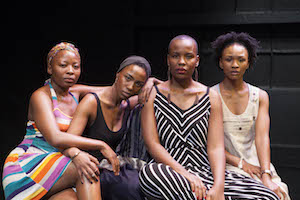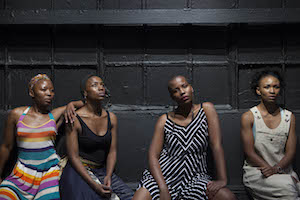 Nina Simone was more than just a pretty voice.
Nina Simone was more than just a pretty voice.
She was an activist as well as a singer, using her lyrics to deliver messages to shake people out of their complacency. Lyrics that would present black people as they are, not as white people chose to see them, and that would stir people into action instead of hopeless acceptance.
That stance makes a play about Simone perfect material for the Market Theatre’s annual celebration of Black History Month, an event supported by the US Embassy.
For the past two years the chosen production has been all about the men, so Nina Simone Four Women is a welcome choice to redress the balance. It was written by Christina Ham and takes place in the 16th Street Baptist Church in Birmingham, Alabama in 1963, the day after a racist bomber killed four young girls. That marked the moment when Simone chose to stop being a sultry nightclub singer in whites-only bars and use her voice for activism.
The play cleverly uses the lyrics in Simone’s rebellious song Four Women as the guideline for its characters. Sarah (Lerato Mvelase) is sweetly convincing as the maid who holds down two jobs to make ends meet, and choses the path of prayer rather than actual action. Siffronia (Noxolo Dlamini) is the ‘yellow bone’, looked down on by whites for being black and despised by blacks for being too pale.
 Sweet Thing the hooker is played by Mona Monyane Skenjana, and Busi Lurayi plays Nina, incongruously dressed in chic clothes in a bombed out church, where she starts playing around with lyrics to try to capture the outrage and the sorrow. There’s a pianist on stage with them as part of the six musicians who play the tunes and add to the depth of vocal sound.
Sweet Thing the hooker is played by Mona Monyane Skenjana, and Busi Lurayi plays Nina, incongruously dressed in chic clothes in a bombed out church, where she starts playing around with lyrics to try to capture the outrage and the sorrow. There’s a pianist on stage with them as part of the six musicians who play the tunes and add to the depth of vocal sound.
The production directed by James Ngcobo is a narrative-led play, rather than a musically led hit parade, but the strength of this particular cast lies more with their excellent singing than their acting.
It’s a long script and feels that way, with the women bickering or debating over the right way to combat racism and each coming with their own back story to share. There’s plenty of history in here too, with the characters having to outline some of the events that have unfolded in black America’s ongoing battle for equality so today’s audience knows where they’re coming from.
I found one of the weaknesses was the monochrome - and therefore monotonous - feel of the emotions. Lurayi as Nina is always angry and combative, with little sign of any warmth or sympathy. She brings a lithe sexiness to the role, but a more nuanced performance where she tones down the aggression and lets a wider range of emotions bubble through would add enormously to making her more human.
Skenjana’s character of the hooker is painted as a complete stereotype, screechily loud and over the top. Although her arrival proved a welcome interruption to the wordy and worthy debate raging between the other three women.
Then there’s the problem of diction – the script apparently has several quotable quotes from the characters about the importance of standing your ground, making a difference, and from Simone in particular, why she chose to use her music for activism. But sometimes the words were lost amid the US accents or uneven, unemotive phrasing, and you felt that some verbal gems had probably slipped away. Microphones playing up with feedback in the early part didn't help, either.
On the plus side, the presence of the pianist, live band and additional vocalists adds a rich quality to the musical numbers, and the lighting by Mandla Mtshali and costumes by Onthatile Matshidiso add greatly to the atmosphere.
The voices are excellent, but the dramatic impact needs tuning up a bit.
Nina Simone Four Women runs at the Market Theatre until February 24. Tickets from Webtickets.